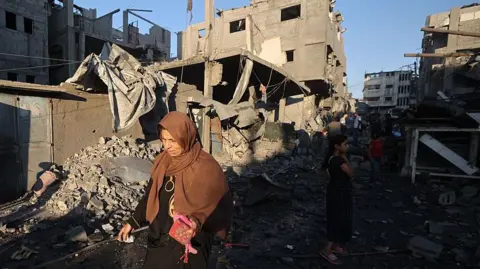### Tensions Rise as Ceasefire Negotiations Collapse in Doha
Recent developments surrounding Gaza have highlighted the intensifying conflict as Israeli and American negotiators exited ceasefire discussions in Doha, Qatar. The departure was sparked by accusations from Washington against Hamas, suggesting that the organization has not shown a commitment to genuinely pursuing a ceasefire resolution. This latest turn of events casts a shadow over the already fraught situation in the region.
In a statement, U.S. special envoy Steve Witkoff noted that the U.S. delegation would return home for consultations following Hamas’s latest response, which Witkoff interpreted as a clear indication of the group’s lack of genuine interest in achieving a ceasefire. This ultimatum has raised eyebrows internationally, as the consequences of the ongoing violence in Gaza continue to escalate.
On the Israeli front, there was no formal announcement regarding the reasons behind their withdrawal from negotiations. However, a senior Israeli official communicated to local media that there was “no collapse” in negotiations, suggesting ongoing tensions without a definitive breakdown. The official’s comments do underline a certain level of complexity in the negotiations, hinting that despite the tensions, discussions are not yet entirely exhausted.
### Hamas’s Response: Discontent and Commitment to Continue Dialogues
Reacting to the accusations leveled by Witkoff, Hamas expressed surprise and disappointment at the U.S. envoy’s remarks, reaffirming its eagerness to persist with negotiations. This indicates a willingness for dialogue, contrasting sharply with the narrative being painted by the U.S. and Israel. The response from Hamas emphasizes its determination to seek a resolution, portraying the group in a more constructive light, even as accusations of their intentions loom large.
Throughout the ongoing discussions, various mediators, including representatives from Egypt and Qatar, have recognized the persisting gaps in the negotiations on critical issues. Witkoff acknowledged these challenges, stating that despite significant efforts to mediate, Hamas has yet to display a coordinated approach or an intention to act in good faith. The acknowledgment from multiple sides that substantial barriers remain may indicate an impasse that could have troubling ramifications for the future of peace in the region.
### Humanitarian Crisis Deepens Amidst Hostility
The backdrop of these diplomatic struggles is a rapidly deteriorating humanitarian crisis in Gaza. The United Nations’ Palestinian refugee agency (UNRWA) has reported alarming statistics, with one in five children in Gaza City now facing malnutrition—an issue that appears to be worsening day by day. Over a hundred international aid organizations have issued dire warnings about mass starvation and the urgent need for political action to alleviate the escalating crisis.
Israel maintains a tight grip on the entry of all supplies into Gaza, claiming that its blockade is necessary for security reasons while blaming Hamas for the humanitarian issues. Following a two-month ceasefire, Israel halted aid deliveries in early March, and although the blockade was momentarily eased, the situation regarding essential resources like food, fuel, and medicine has significantly worsened.
### Casualties Mount Amid Ongoing Strife
As the humanitarian situation unfolds, the toll on human lives has been devastating. Reports emerging from Gaza indicate that over 1,000 Palestinians have lost their lives due to military actions in proximity to aid distribution points. This figure is a stark indicator of the risks faced by civilians amid the ongoing conflict, particularly around delivery points monitored by foreign private security contractors and located within Israeli military zones.
The Israeli military’s operations are a direct response to a Hamas-led attack that occurred on October 7, 2023, claiming approximately 1,200 lives in southern Israel and resulting in numerous hostages. Since then, the violence has created catastrophic repercussions, with the Hamas-run health ministry in Gaza reporting a staggering death toll exceeding 59,000 individuals.
### Conclusion: The Path Forward Uncertain
As both sides retreat from negotiations, the prospect of a viable ceasefire seems increasingly remote. Statements from both Hamas and Israeli officials illustrate a complex web of accusations, with neither side willing to yield. The responsibility for understanding the immense implications of these developments lies heavily on international communities. Unless productive dialogue resumes, the humanitarian crisis will likely deepen, and the cycle of violence may perpetuate further, engulfing the entire region in turmoil. In light of this grave situation, the calls for a lasting resolution are louder than ever.












